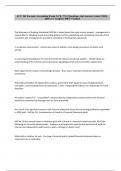Exam (elaborations)
ACC 362 Forensic Accounting Exam 3 (Ch. 7-9) | Questions And Answers Latest {} A+ Graded | 100% Verified
- Course
- Institution
ACC 362 Forensic Accounting Exam 3 (Ch. 7-9) | Questions And Answers Latest {2024- 2025} A+ Graded | 100% Verified
[Show more]



